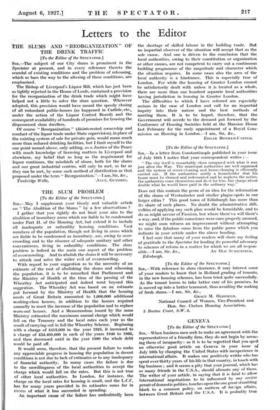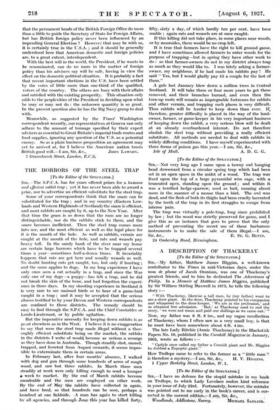GENEVA
[To the Editor of the SPECTATOR.]
SIR,—When business men seek to make an agreement with the representatives of a friendly firm, they do not begin by accus-
ing them of incapacity : so it is to be regretted that you spoil an otherwise good article on Geneva in your issue of July 16th by charging the United States with inexperience in international affairs. It makes one positively writhe who has spent over thirty years of his life in that country, in touch with big business ; and it seems a pity that your journal, which has so many friends in the U.S.A., should alienate any of them. The writer of your article, in saying that it is fatal to allow international negotiations to be influenced by any arriere pens& of domestic politics, touches upon the one great stumbling block to a common policy, on matters of fortzign affairs, between Great Britain and the U.S.A. it is probably true
that the permanent heads of the British Foreign Office do more than a little to guide the Secretary of State for Foreign Affairs, but has British foreign policy never been influenced by an impending General Election ? However that may be with us, it is certainly true in the U.S.A. ; and it should be generally understood here that American domestic and foreign policies are, to a great extent, interdependent.
With the best will in the world, the President, if he wants to be renominated, can do no more in the matter of foreign policy than his advisers say will be safe, having in view the effect on the domestic political situation. It is probably a fact that recent important elections in the U.S. have been settled by the votes of little more than one-third of the qualified, voters of the country. The others are busy with their affairs and satisfied with the existing prosperity. This situation only adds to the perplexities of the President in deciding upon what he may or may not do : the unknown quantity is so great. In the present question also he has the Big Navy group to deal with.
Meanwhile, as suggested by the Times' Washington correspondent recently, our representatives at Geneva can only adhere to the amount of tonnage specified by their expert advisers as essential to Great Britain's imperial trade routes and food supplies, ignoring any question of the U.S. as a potential enemy. So as a plain business proposition an agreement may yet be arrived at, for I believe the American nation trusts







































 Previous page
Previous page